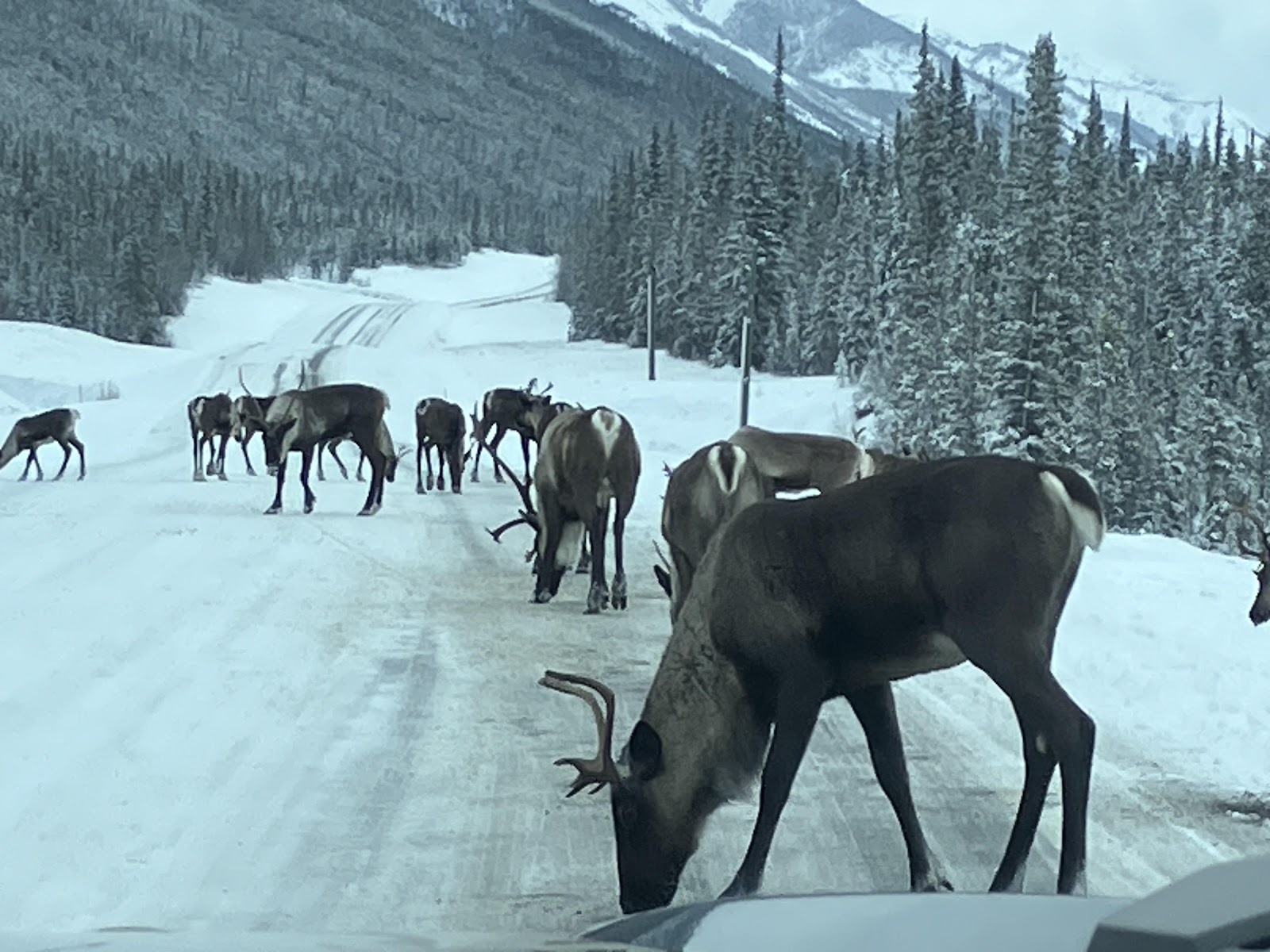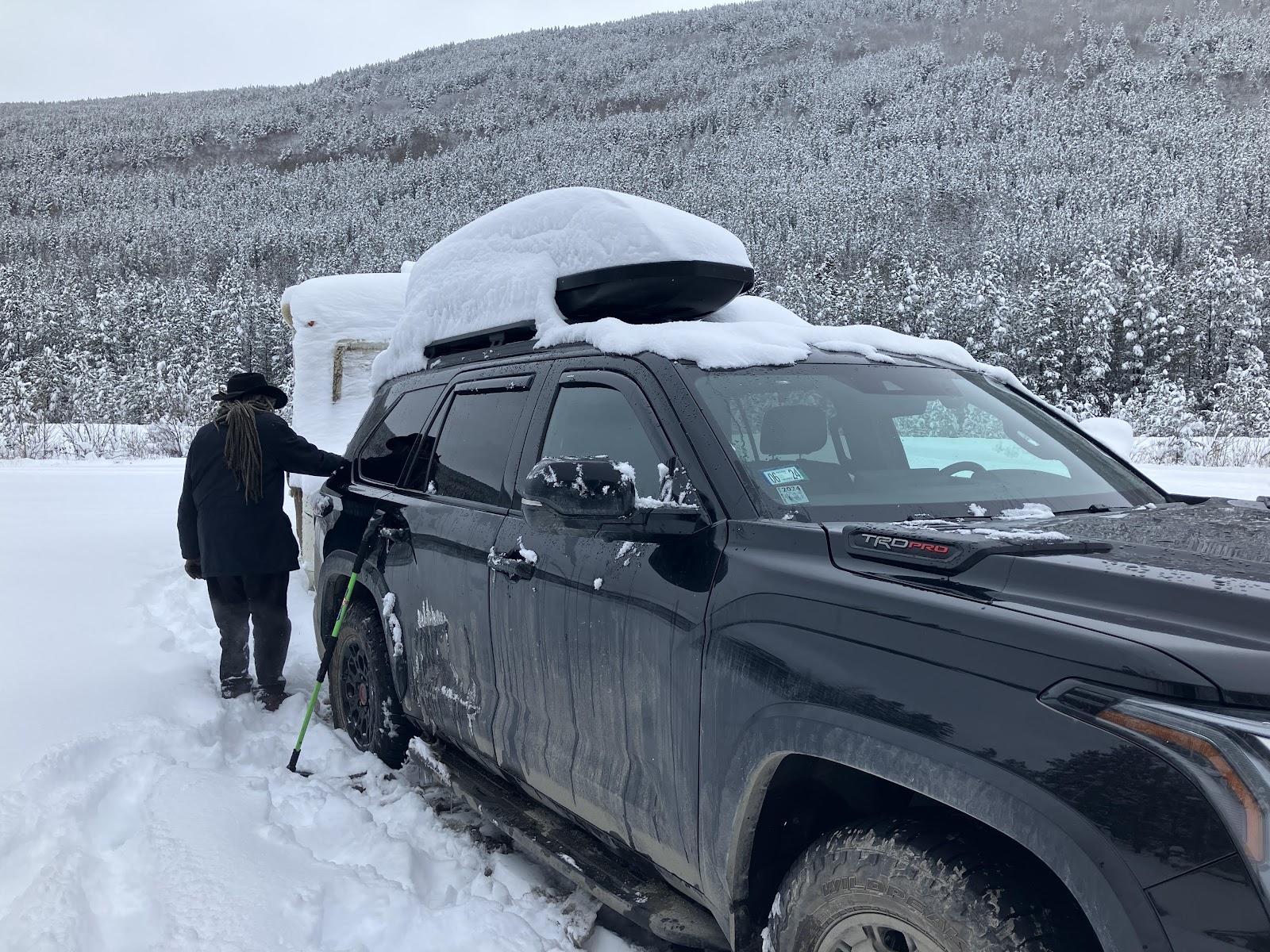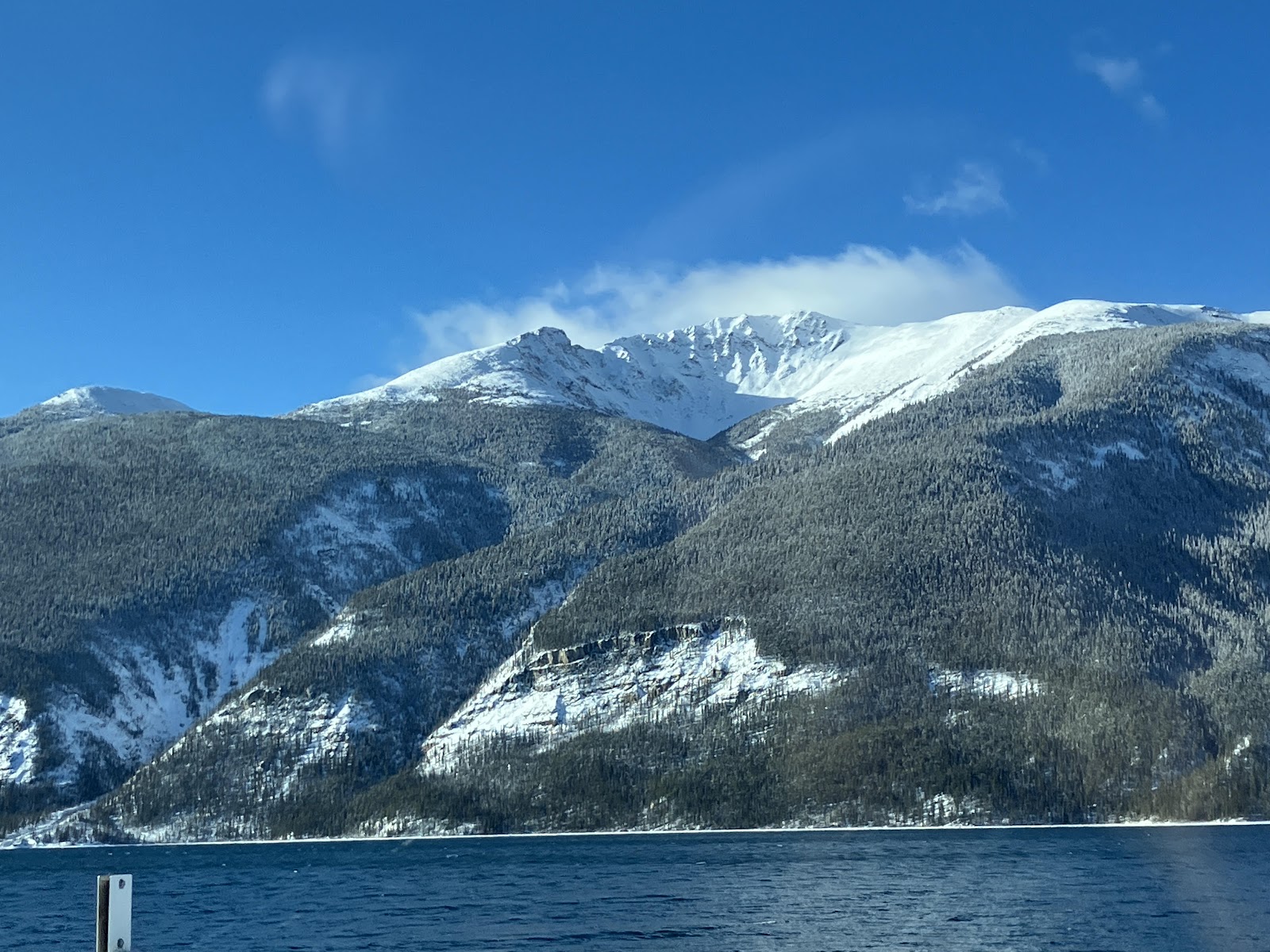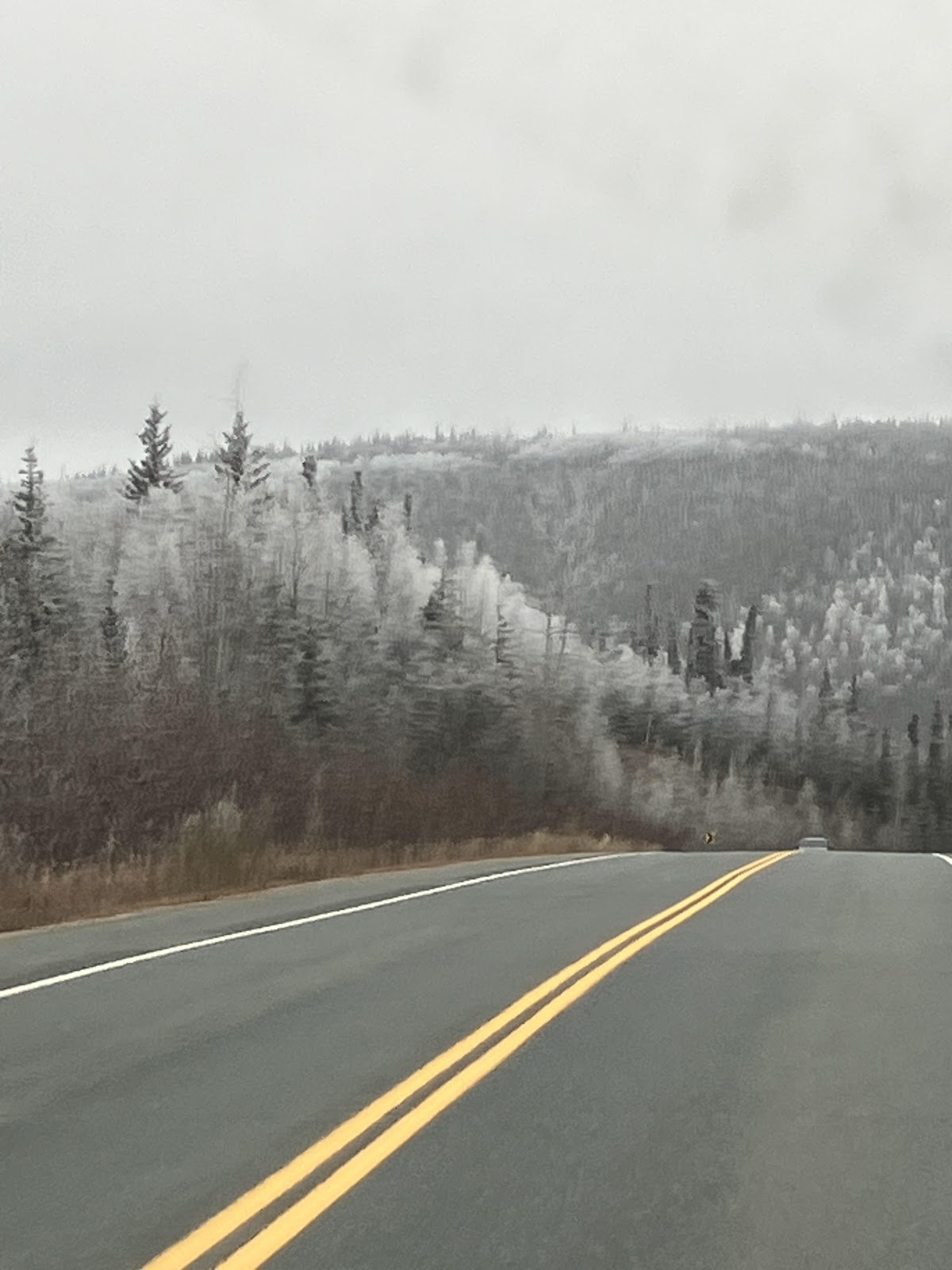The Road Less Taken 10.23.24
Spoiler alert: We did NOT outrun winter.
Those of you who may have thought we were making a mistake
heading north in the fall can exercise your right to say, toldja so.
Those of you who thought we’d get caught in the first
snowstorm can consider your point well taken.
But … see what’s not in this picture? Snow!
We did survive it and emerged intact.
Mostly.
From the time we got to Tok, we were retracing our steps
from weeks before when we headed north, so we did not linger. Besides, we really wanted to get away from
snowy roads. The locals clearly know how
to read the roads and buzzed by at 60-80 kph while we poked along to the far
right at about 30. Occasionally the
drivers would honk at us in annoyance. I
know what they were thinking:
amateurs! They were right.
By the time we reached Watson Lake, two days later, we felt
as if the first snowstorm of the season was following us, for it was hitting
everywhere just as we did. We stopped to
eat and got into conversation with a man who had just come from the south. He confirmed that the roads were just as bad
in that direction. He also mentioned
that he had seen the bison herd that lives in that area, and that there was a
new brownish-colored calf.
We did see the bison.
They were not on the move, but resting and grazing quietly by the
road. And sure enough, there was a
little brown calf. We could not get a good photo, though, because they were still and we had to keep moving. We also saw several
groups of caribou. Some were right on
the roadway and took their time getting out of the way. They seemed to be licking something off the
pavement, and we were told later that the sand on the roads had some salt mixed
in. I wouldn’t have thought so. It doesn’t seem like enough salt to me, but
apparently it was enough to attract the caribou.
Heading toward Muncho Lake on Saturday night, we hit steady
snow flurries, but plugged along with the hope of staying at the Northern
Rockies Lodge and RV Park. We noticed a
light at the back of our rig vibrating erratically, and shortly we heard a bang
and a dragging sound. We confirmed that
the hitch holding the cargo box, which holds the equipment used to hook the
trailer to various utilities, had broken and the box was dragging behind. We pulled over and though the traffic was
sparse on that road, as always, a young man named Hector stopped and helped LCR
remove the cargo box. We were trying to
figure out what to do next when another truck stopped by. A man named Cedar and his family, several
young men, offered to take the cargo box and the trailer spare tire cover in
their truck to Fort Nelson, which they said was 3-4 hours away. We were grateful for this offer but said
there was no way we were going to make Fort Nelson that night – it was already
evening by this time and had started to snow in earnest. They said they would leave the box with the
RCMP, the Royal Canadian Mounted Police, and we could pick it up when we got
there. I don’t know if Cedar has had
experiences with the RCMP, and knew that would be okay, but it was a great
idea. We really had no alternative. The cargo box is too big to fit either in the
trailer or the truck. At Hector’s
suggestion, we kept the trailer spare tire with us, putting it in the trailer.
We bid Cedar and his crew and Hector good-bye and
continued. By now it was completely dark
– and believe me, it gets totally dark in the mountains, with black hills
closing in on you from both sides and no lights, not a farm floodlight or a
hint of a town, for many miles. It was
also snowing harder. The snow falling
against the darkness had a disorienting effect.
We were trying to go very slowly, but it was sometimes impossible to
tell whether we were sliding or not moving at all. About ten minutes after they left us, we went
into a skid and I felt a bump. I thought
something had hit us. I was driving and
in my left mirror I could see that what we had hit was us – the trailer had
jackknifed. Suddenly I had no control
over the rig. While my brain churned out
the old driver’s ed rule, Turn in the Direction of the Skid, I heard my own
voice praying. I don’t usually pray out
loud, but this time I did. I think I
just said, Lord, we need help, over and over again. I managed to come to a stop and we changed
drivers. LCR inched us off the road onto
a more or less flat area, which turned out to be a pull-out for truckers to
rest, just the help we needed. We declined
to go any farther that night. We got
completely off the road, and it was just like dry camping anywhere else. Once we stopped shaking.
The next morning the spare tire, which we had put outside
the trailer to use as a step, was covered with snow. There was maybe 4 inches of new snow. We could not get out onto the road and
eventually got stuck. Several drivers
stopped to ask if they could help, but none had any idea how to get the trailer
out of the snow. We did not even have a
shovel – it was in the cargo box. They
offered to have a tow truck called for us.
After several hours and trying various strategies, we did finally get
the trailer disconnected and the car on the road.
It was not far to the Northern Rockies Lodge, and once
there, we discovered they have a handout sheet of instructions and phone
numbers just for road emergencies. And
the nearest towing service was in Fort Nelson!
There was also no cell service in either direction. They had Wi-Fi calling, which did not work on
my phone, and the desk clerk kindly lent me her phone to call. We were informed that a tow driver could be
there in two hours.
There being nothing to do but wait, we made ourselves
comfortable in the lobby. The Northern
Rockies Lodge is an upscale hotel in the midst of the wilderness, a beautiful
building, all honey-colored wood with huge beams like a log cabin. There was a sophisticated but relaxed vibe,
with a three-course dinner menu and dinner seating times, as well as a take-out
menu. We had a pizza while we waited.
The clerks were also unfailingly cheery and helpful to everyone who
walked in. I noticed that like people
elsewhere in the north country, no one looked like they had money; people were
unpretentious – everyone dressed practically and comfortably. The hotel was expensive, of course, because
as in Alaska, everything has to be shipped in.
But it seemed like they gave value for the money. There was a steady stream of customers
despite the expense, the weather and the remote location.
After 3 ½ hours we attempted to call the towing service to
see when we could expect our tow, but were told the company has no way of
calling the drivers – no cell service, remember. I still don’t understand why they don’t use
CB radios like the truckers do. Eventually
the driver came and we left the hotel shortly after that, to meet up with the
crew at the spot where our trailer still languished in the snow. They really knew what they were doing, pulled
the trailer out and hooked us up in just minutes. The towing service was very busy. The drivers told us they had pulled out
18-wheelers during this storm, as well as a train, a bit to the west. We drove very gingerly to the Lodge and took
a hookup for the night. Though it was
expensive, as with the hotel guests, the staff was gracious and courteous and
we felt so safe and glad to be there.
The drive to Fort Nelson the next day went a little better, since the sun was out and there was no fresh snow. That stretch of the 97 has sharp curves and we had to watch out for more caribou and a small group of Dall sheep, right on the edge of the road around a curve. We were in no hurry, just happy our trailer and truck were moving okay.
When we got to Fort Nelson and found the RCMP office, it was closed for the day but there were several officers out back. They were happy to see us. They had our cargo box all right, and we told them we’d get the hitch fixed the next day and be back to pick it up. I exclaimed at how awesome it was that Cedar, a perfect stranger, had brought the box for us, and one officer said, Welcome to Canada!
The RV park we found, the only one for many miles, seemed
deserted except for one trailer. There
were instructions for off-season rates and a lockbox, cash only. We met a young woman who was using the
laundry. She gave us the info on the
campground, and we told her how we happened to be there. She and her husband were in that lone rig and
had the transmission go out on their tow vehicle. They were stuck there for another week or
so. We told her: You win!
The campground itself, laundry and bathrooms were unlocked
24/7. Canada.
It took a morning of calling and driving to find a place to
get the work done. One mechanic, named
Jake, said he could do what was needed.
We spent the day having breakfast at a local restaurant, making calls
from the truck, and generally just waiting.
Besides replacing the hitch on back of the trailer, Jake
spotted other things that needed work, including a tire worn unevenly because
of a bent axle, a new trailer hitch for the truck because the original was bent
(which would take considerable force), some panels on the truck that were out
of place due to the jackknifing – a lot more needed to be repaired or replaced
than we realized. He asked, how long
have you had that rock in your brakes? I
thought it was a metaphor, maybe for a rocking motion or noise, but it was
actually a small trapped rock. Some of
the problems we had fixed could have had serious consequences. It was a long and expensive day, but we feel
the rig is in a lot better shape now.
We were given final instructions by Jake at the end of the
day, the whole of which he had spent working on our trailer and truck. Back at the RCMP office, the Mounties once
again proved to be helpful in helping LCR get the cargo box back in place and
the trailer license (which had come off) re-mounted.
In short: Canadians
are fantastic; Canadian roads, like Alaskan roads, are harsh.
Now hear this: Winter
in the north country is BRUTAL!!












Comments
Post a Comment